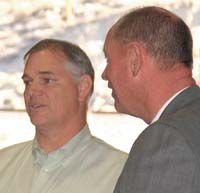Representative says year went quietly and smoothly
| Rep. Brad King (L) said this last year was pretty smooth in the legislature. He’s seen here at the November opening of the DNR facility in Price. |
Rep. Brad King said he was glad that this year was a business-like one in the house of representatives at the state legislature. Afterall, it could be his last year serving the people of district 69.
“It’s been a great pleasure to represent the people of my district for the last 12 years,” he said on Tuesday. “Regardless of what happens in the future I’ve always been thankful for the support I have received from home.”
King, who has filed for Sen. Mike Dmitrich’s seat in the senate from district 29, knows that nothing is a sure thing and a return to the capitol in another capacity is a dream he has had, and now hopes to realize. But for this year he was satisfied with what the legislature did, based on the money projections they had to work with.
“This wasn’t like many other election years I have seen on the hill,” said King. “It was smooth. There were no crazy message bills; we balanced the budget and we dealt with what was really necessary to deal with.”
The biggest surprise of the session was when the fiscal analysts proposed much lower tax revenues than were expected by most of the lawmakers, and because of that they had to adjust. In many, cases it meant many people didn’t get what they wanted.
“With $340 million dollars less than what we anticipated we would have, the budget was a dilemma,” said King. “We had to pare it down considerably. We had requests for three times the amount of money that we had to work with.”
In education King says that the legislature gave an across the board raise to all teachers in the amount of $1700, plus a 2.5 percent increase in the weighted pupil unit which is used by the school districts to negotiate raises. The $1700 does not apply to administrators or classified personnel. The lawmakers also approved $20 million for school districts to use as they develop merit pay systems for teachers and another $5 million as signing bonuses for new teachers. The state has been having a hard time attracting and keeping new teachers because salaries in surrounding states have traditionally been higher.
In higher education, budget wise, each college got a 3 percent increase. Locally the College of Eastern Utah did get $600,000 to operate the Western Energy Training Center. And the legislature also directed the state board of regents to study the issue of mergers and partnerships amongst the states schools of higher education.
“In that bill, was specific language concerning the situation between Utah State and CEU,” said King. “That language was probably in response to the proposed merger between the schools that was advanced in a bill that did not get voted on in either branch of the legislature this session.”
While money was tighter than legislators thought it would be, the legislature also gave the Utah Department of Transportation $25 million to help with “choke points” on the state’s highway system.
“Some of that money will apply to Highways 6 and 10, but of course more will go toward Interstate 15,” stated King.
Last fall Governor Jon Huntsman said that health insurance and coverage for everyone in the state would be one of his big priorities this year. But with reduced money, much of that emphasis fell by the wayside when the legislature was actually able to deal with it.
“The beginnings of his program were initiated through the actions of the legislature this year,” said King. “We passed a bill that allows self employed people to purchase health care insurance with pretax dollars. But a lot more needs to be done. Utah leads the nation in the number of employers who are dropping health care for their employees. A task force has been set up to concentrate on health care and its affordability, portability, quality and accessibility.”
Recently the Utah Mine Safety Commission that was set up by the governor after the Crandall Canyon disaster released their findings and many of those suggested that the legislature do certain things.
“Very few of those recommendations were taken up, because of the amount of money available,” stated King. “Other than the money to operate the WETC (which played a large part in the commission’s recommendations) the legislature appropriated money for the state labor commission to work on the program and create a new working relationship with MSHA.”
The legislature put up $280,000 to get started on implementing some of the commission’s recommendations. Obviously, more appropriations will be needed later.
With 1,100 total bills set forth on the hill (a record number according to King) he felt the legislature did well considering the amount of money available. And this year he felt legislators were reasonable in their efforts.
“What tax cuts there were were balanced by increases in other areas. This was the first time in three years that there was no talk of tax cuts,” concluded King.

